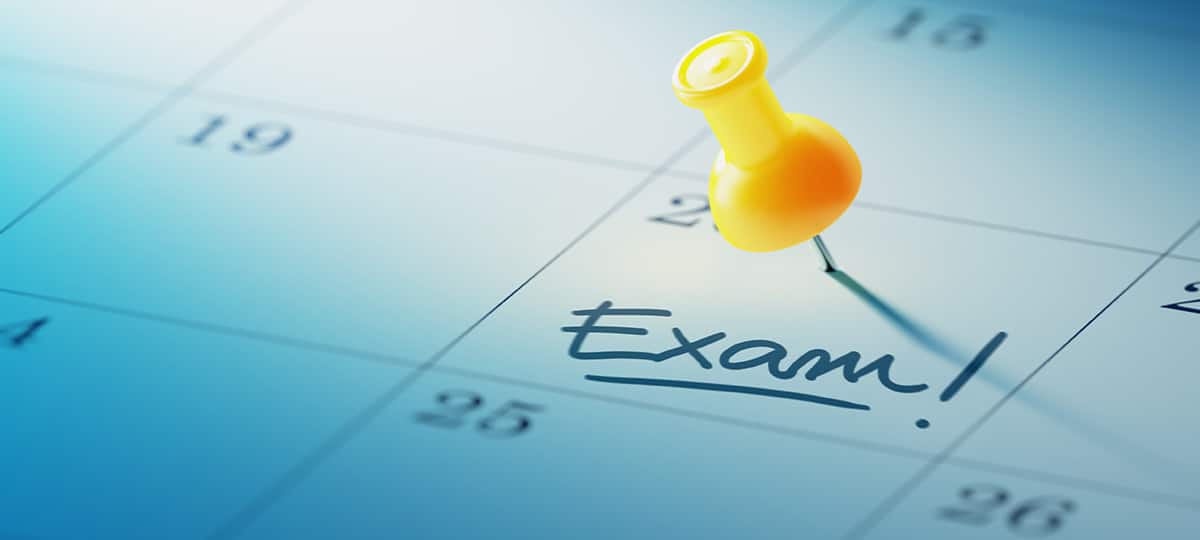First things first:
- The most common form of oral examination is the one-on-one interview.
- Expertise alone is not everything: You should also actively steer the exam interview.
- Don’t be afraid of stage fright: We’ll show you how to structure your answers well.
Find out about the exam
In order to prepare yourself optimally and thus avoid the fear of the unforeseen, you should find out as much as possible about the exam and its process in advance.
In the study and examination regulations you will find the specified requirements that await you.
In addition, discuss the topics with the examiner and register for the exam.
Exams differ at different universities or colleges.
However, the most common form of an oral exam is the one-on-one interview.
Usually you get a preparation time in which you can go into yourself again.
This often gives you the opportunity to work out your answer to the first question.
Your examiner will then ask you questions that you should either answer in a fixed time or that should lead to a free conversation.
Therefore, be sure to ask your lecturers in advance how the exam will proceed in order to be able to prepare you in the best possible way.
This knowledge will also take away your nervousness.
Prepare yourself sufficiently in terms of content
Sufficient learning is essential before an oral exam in order to pass.
Don’t start studying shortly before your exam date, but use the entire semester to study along.
Creating a schedule can be useful here.
In this way, you can divide the lecture time profitably for learning.
So get an overview of the required topics and summarize them in a meaningful way.
Make sure that you not only know the topics by heart, but can also put them in a logical context.
You should be able to critically examine and discuss them.
Guide the exam interview
An oral exam is primarily about your knowledge.
Of course, a certain amount of self-expression is also important, but examiners want to see above all that you have mastered the content of the course.
Be aware that what you say will lead directly to the next question.
In the best case, an oral exam should lead to a fluent conversation from which the next questions emerge.
This situation is ideal for you to take on the active part!
In order to be able to take an active role in an exam interview, you need specialist knowledge on the one hand and the willingness to deliver more than is required of you on the other.
Specialist knowledge is essential for exams in order to be able to answer the required questions.
In addition, you should respond to a large extent and present your knowledge.
A longer answer with key terms, examples, and critical questioning will help you pass your exam with flying colors.
By linking your knowledge and answering beyond the obvious solution, you show your examiner that you have internalized the topic.
Giving longer answers will also prevent the examiner from asking you too many questions.
The more questions you get, the more likely it is that you won’t be able to answer one of them.
Structure your answers
Of course, you can’t tell in advance what answer your examiner would like to hear.
However, a detailed answer that does not consist of just one sentence is definitely useful.
A good structure can help you present your knowledge in the best way.
Follow a three-step process:
- Present the question in an overarching context and name key terms.
- Now the substantive answer to the question will take place.
Use technical terms for your answer. - In the third step, you can give an example to support your argument.
With the help of this response tactic, you have a framework to stick to.
This will also help you deal with exam anxiety better, as you will have a rough guide to your answer.
You can see this possibility of replying as a kind of guideline.
However, expect that your examiner will interrupt you to ask you an intermediate question.
This is mainly to see whether you can spontaneously deal critically with the topic.
Try to build a natural conversation and be flexible with the answers and nudges that are provided to you.
Avoid exam stress
Are you nervous and excited before your oral exam?
Don’t worry, that’s what happens to many students.
At the beginning of the exam, the excitement usually disappears on its own.
If you didn’t understand a question from the examiner, don’t be afraid to ask.
This will give you some time to think about your answer and understand the question better.
If the exam contains a topic that you don’t have ready, try to bring in your other knowledge.
By conducting the conversation skillfully, you avoid creating gaps in the conversation.
Having gaps in knowledge is completely normal.
You just have to show your examiner that you have plenty of knowledge in addition to your gap.
With conscientious preparation, you don’t have to be afraid of the exam interview.
GRIN wishes you every success in your next exam!
Do you like our magazine? Then sign up for our GRIN newsletter!









